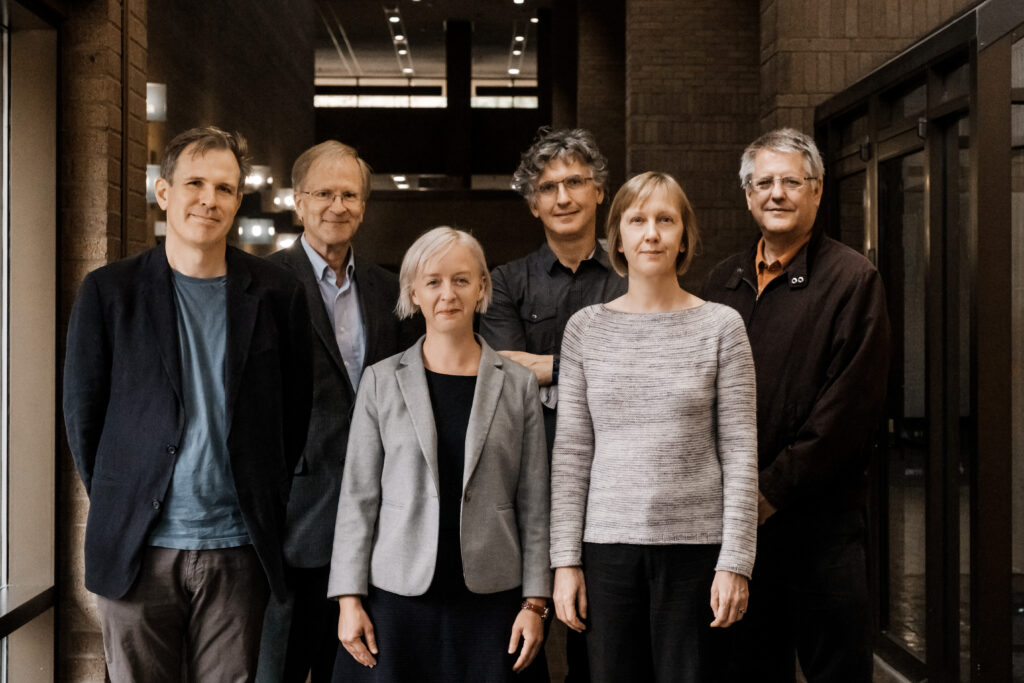
Music Theory faculty, from left to right: Eric Drott, Robert Hatten, Chelsea Burns, John Turci-Escobar, Marianne Wheeldon, Jim Buhler
 James Buhler
James Buhler
Professor of Music Theory
James Buhler received his Ph.D. from the University of Pennsylvania in 1996. His research interests include the history and theory of the sound track, auditory culture, and critical theory. He is author with David Neumeyer of Hearing the Movies, atextbook now in its second edition on music and sound in film for Oxford University Press (2015). His Theories of the Soundtrack will appear with Oxford University Press in the fall of 2018. Dr. Buhler is also series editor of California Studies in Music, Sound, and Media and serves on the editorial boards of The Journal of Musicology and Music, Sound, and the Moving Image. He is Director of the Center for American Music.
Recent and Forthcoming Publications
Books
- (in preparation) Toward a Vococentric Cinema
- Theories of the Soundtrack. Oxford University Press, 2019 (release date: October 2018)
- Hearing the Movies. Second Edition. With David Neumeyer. Oxford University Press, 2016.
Edited Collections
- (in preparation) Music in Action Film: Sounds Like Action!. Routledge. With Mark Durrand
- Voicing the Cinema. University of Illinois Press. With Hannah Lewis
- Music and Cinema. Wesleyan University Press, 2000. With Caryl Flinn and David Neumeyer.
Articles
- “Blank Music: The Marketing of Music Production Software.” In Oxford Handbook on Music and Advertising, edited by James Deaville, Ron Rodman, Siu-Lan Tan. New York: Oxford University Press, forthcoming.
- “The End(s) of Vococentrism.” In Voicing the Cinema, edited by James Buhler and Hannah Lewis. Illinois University Press, forthcoming.
- “Cinematic Listening and the Early Talkie.” In The Oxford Handbook of Cinematic Listening, edited by Carlo Cenciarelli. New York: Oxford University Press, forthcoming.
- “Silent Film, Music, and Fantasy During the Transition to Sound.” In The Routledge Companion to Global Film Music in the Early Sound Era, edited by Jeremy Barham. New York: Routledge, forthcoming.
- “Branding the Franchise: Music, Opening Credits, and the (Corporate) Myth of Origin.” In Epic Music in Film: Spectacular Listening, edited by Stephen Meyer, 3-26. New York: Routledge, 2017.
- “Wagnerian Motives: Narrative Integration and the Development of Silent Film Accompaniment, 1908-1913.” In Wagner and Cinema, edited by Sander L. Gilman and Jeongwon Joe, 27-45. Bloomington: Indiana University Press, 2010.
Chelsea Burns
Assistant Professor of Music Theory
Chelsea Burns received her PhD in the Theory and History of Music from the University of Chicago in 2016. Prior to arriving at the University of Texas, she was Assistant Professor of Music Theory at the Eastman School of Music, and she previously taught in the music department at Harvard University. Her research interests include Latin American modernist concert music as well as bluegrass, country, and old-time musics. She is especially interested in the ways that contexts—economic, political, material—affect analytical interpretation. Her research suggests that such contextual understanding shapes analysis in critical ways, at times undermining or reversing prevailing musical interpretations. Her work touches on issues of race, postcoloniality, instrumental technologies, and expressions of privilege and class, among others.
Professor Burns has presented papers at national conferences of the Society for Music Theory, the American Musicological Society, the Society for American Music, and the Latin American Studies Association. Recent and forthcoming publications address issues of exoticism and modernism in relation to Brazilian indigeneity, the pedal steel guitar in 1960s country music, and issues of genre and race in 1970s country music.
Publications:
- “‘Musique cannibale’: The Evolving Sound of Indigeneity in Heitor Villa-Lobos’s Tres poêmas indigenas,” Music Theory Spectrum (forthcoming, 2021)
- “The Racial Limitations of Country Soul-Crossover in Bobby Womack’s BW Goes C&W, 1976,” Journal of Popular Music Studies vol. 32 no. 2 (June 2020). https://online.ucpress.edu/jpms/article/32/2/112/110774/The-Racial-Limitations-of-Country-Soul-Crossover
- “‘Together Again,’ but We Keep On Crying: Buck Owens, Tom Brumley, and the Pedal Steel, 1964,” Music Theory Online vol. 25 no. 2 (July 2019). https://mtosmt.org/issues/mto.19.25.2/mto.19.25.2.burns.html
Recent papers:
- “Global Modernisms in Ethnomusicology.” Society for Ethnomusicology annual meeting, 2020
- “Country Music, Who Are You?” International Association for the Study of Popular Music, US Chapter annual meeting, 2020 (rescheduled to 2021 due to Covid)
- “Race, Dialect, and Regionalism in Oscar Lorenzo Fernândez and Waldemar Henrique’s Settings of ‘Essa Negra Fulô,’” Society for American Music annual meeting, 2019
- “Boston Bluegrass: Institutional Traces in the Urban Scene,” Bluegrass Symposium at the International Bluegrass Music Association annual conference and festival, 2017
 Eric Drott
Eric Drott
Associate Professor of Music Theory
Eric Drott received his PhD from Yale University in 2001, where he taught prior to coming to the University of Texas at Austin. His research focuses on contemporary music culture, music and protest, French cultural politics, and digital music cultures. His book, Music and the Elusive Revolution (University of California Press, 2011), examines music and politics in France after May ’68, in particular how different music communities (jazz, rock, contemporary music) responded to the upheavals of the period. He is currently at work on two new projects: The Oxford Handbook of Protest Music, co-edited with Noriko Manabe, and a book on streaming platforms provisionally titled, Streaming Music, Streaming Capital.
Prof. Drott has presented papers at national and international conferences, including the Society for Music Theory, the American Musicological Society, the International Musicological Society, the Modernist Studies Association, and the International Conference on Twentieth-Century Music. His articles have appeared in the the Journal of the Society for American Music, Critical Inquiry, Twentieth-Century Music, Journal of Music Theory, the Journal of the American Musicological Society, as well as several collections of essays. He is also a recipient of a research fellowship from the National Endowment for the Humanities. In 2020, he was awarded the Dent Medal from the Royal Musical Association.
Books:
- Music and the Elusive Revolution: Cultural Politics and Political Culture in France, 1968-1981 (University of California Press, 2011).
- Streaming Music, Streaming Capital (in progress)
- Oxford Handbook of Protest Music, co-edited with Noriko Manabe (in progress).
Recent publications:
- “Fake Streams, Listening Bots, and Click Farms: Counterfeiting Attention in the Streaming Music Economy.” American Music vol. 38 no. 2 (Summer 2020).
- “Music in the Work of Social Reproduction.” Cultural Politics vol. 15 no. 2 (Summer 2019).
- “Music as a Technology of Surveillance.” Journal of the Society for American Music vol. 12 no. 3 (August 2018).
- “Musical Contention and Contentious Musics; or, the Drums of Occupy Wall Street.” Contemporary Music Review (November, 2017).
- “Saariaho, Timbre, and Tonality.” In Tonality since 1950, ed. Philip Rupprecht and Felix Wörner. Steiner Verlag, 2017.
Robert S. Hatten
Marlene and Morton Meyerson Professor in Music
Professor of Music Theory
Robert S. Hatten joined the faculty in Fall 2011 as Professor of Music Theory, having taught previously at Indiana University. His first book, Musical Meaning in Beethoven: Markedness, Correlation, and Interpretation (Indiana University Press, 1994), was co-recipient of the Wallace Berry Publication Award from the Society for Music Theory in 1997. His second book, Interpreting Musical Gestures, Topics, and Tropes: Mozart, Beethoven, Schubert (Indiana University Press, 2004), helped launch the book series “Musical Meaning and Interpretation,” for which Dr. Hatten serves as general editor. Dr. Hatten has served as President (2017-19) and Vice-President of the Society for Music Theory (2005-07), and President of the Semiotic Society of America (2007-08). His research interests include semiotic theories of musical meaning (including agency, expressive genres, gesture, style, topics, tropes, and narrativity), performance and analysis (as pianist), music and the poetic text (as poet), and twentieth-century opera (as librettist and composer). He has given invited papers and keynotes across North American and Europe, and extended lecture series in Poland, Finland, Spain, and Mexico.
Books:
- Musical Meaning in Beethoven: Markedness, Correlation, and Interpretation (Advances in Semiotics, Thomas A. Sebeok, general editor). Bloomington and Indianapolis: Indiana University Press, 1994. Wallace Berry Publication Award, Society for Music Theory, 1997 (co-recipient). Paperback reprint, 2004.
- Interpreting Musical Gestures, Topics, and Tropes: Mozart, Beethoven, Schubert (Musical Meaning and Interpretation, Robert S. Hatten, editor), Bloomington and Indianapolis: Indiana University Press, 2004. Paperback reprint, 2018.
- A Theory of Virtual Agency for Western Art Music (Musical Meaning and Interpretation, Robert S. Hatten, editor), Bloomington and Indianapolis: Indiana University Press, 2018.
Selected Articles:
- “A Speculative Hermeneutics for Music Analysis and Interpretation,” invited, juried article for Treitler Festschrift, Musical Quarterly (submitted)
- “Teaching ‘Performance and Analysis’: A One-Semester Course at The University of Texas,” invited, juried article for DocMus Festschrift [the Sibelius Academy’s 25th anniversary volume celebrating their doctorate in performance studies] (Helsinki: Sibelius Academy DocMus Research Publications, 2020) (to appear)
- “Fundamental Concepts for the Semiotic Interpretation of Musical Meaning: A Personal Journey,” in The Routledge Handbook of Music Signification, ed. Esti Sheinberg and William P. Dougherty (London: Routledge, 2020), 89-98.
- (with Eloise Boisjoli) “Topics,” (invited encyclopedia entry) in The Cambridge Haydn Encyclopedia, ed. Caryl Clark and Sarah Day-O’Connell, 376-82. Cambridge: Cambridge University Press, 2019.
- “Staging Subjectivity as Spiritual Freedom: Beethoven’s ‘Emergent’ Themes,” in Utopian Visions and Visionary Art: Beethoven’s ‘Empire of the Mind’—Revisited, ed. William Kinderman (Vienna: Der Apfel, 2017), 75-88.
- Review, Edward Klorman, Mozart’s Music of Friends: Social Interplay in the Chamber Works (Cambridge: Cambridge University Press, 2016), Music Theory Spectrum 39:2 (2017), 261-65.
Selected presentations:
- “Introduction to A Theory of Virtual Agency for Western Art Music (Indiana University Press, 2018), with Answers to Panel Questions,” invited Zoom presentation for the Brazilian Society for Music Theory and Analysis (Aug. 20, 2020).
- “Interpreting Virtual Subjectivity in Performing Beethoven’s Piano Sonatas: External and Internal Motivations for Extreme Shifts,” invited keynote (lecture-demonstration) for Texas Society for Music Theory conference, “Beethoven 250 Houston 2020,” Feb. 28, 2020. Also taught seminar on topic theory at University of Houston for Prof. John Snyder, Feb. 26.
- “Musical Meaning in Bach,” invited lecture for the Baldwin Wallace University Bach Festival (in collaboration with the Riemenschneider Bach Institute), April 13, 2019.
- “A Theory of Virtual Agency for Western Art Music,” invited lecture for Western University, Ontario, Nov. 30, 2018; and University of North Texas, Sept. 25, 2019. Also taught seminars at each school, for Prof. Kathleen Nolan and Prof. David Schwarz, respectively.
 David P. Neumeyer
David P. Neumeyer
Professor Emeritus of Music Theory
E-mail:
neumeyer@utexas.edu
David Neumeyer is Professor Emeritus of Music Theory in the School of Music. He is the editor of The Oxford Handbook of Film Music Studies (2014), co-editor of Music and Cinema (Wesleyan University Press), and co-author of Hearing the Movies: Music and Sound in Film History (Oxford University Press). His research interests include music in film, linear analysis (including Schenker), and music and social dance in the eighteenth and nineteenth centuries. Early in his career, he wrote The Music of Paul Hindemith (Yale University Press), which won a publication award from the Society for Music Theory in 1987. He serves on the editorial board of Music and the Moving Image. Dr. Neumeyer earned a bachelor’s degree from Michigan State University and master’s and doctoral degrees from Yale University. He taught formerly at Indiana University, where he also served as Director of Graduate Studies in the School of Music (1993-2000).
 John Turci-Escobar
John Turci-Escobar
Lecturer of Music Theory
turci-escobar@austin.utexas.edu
John Turci-Escobar earned a B.A. from Rutgers University (1996) and a Ph.D. from Yale University (2004). His primary areas of interest are the late Italian madrigal, the music of Astor Piazzolla, and Argentine tango. Secondary areas of interest include nineteenth-century chromaticism, Classical form, and broader issues in music and meaning. Turci-Escobar has presented his work at regional, national, and international conferences. He is currently writing a series of articles on the music of Carlo Gesualdo and the late Italian madrigal. He is also preparing a book on the 1965 collaboration between Astor Piazzolla and Jorge Luis Borges.

Marianne Wheeldon
Professor of Music Theory
Marianne Wheeldon received degrees in music theory from King’s College, University of London (B.Mus) and Yale University (Ph.D.). Her research interests include the music of Claude Debussy and its posthumous reception, the analysis of twentieth-century French music, and interdisciplinary topics in music analysis, cultural history, and the sociology of culture. Professor Wheeldon regularly teaches graduate courses in Schenkerian Analysis, Form Theory, and offers doctoral seminars in her areas of interest, including Music and Culture in fin-de-siècle Paris, Music Analysis in Cultural Context, Neoclassicism, and Musical Schemata.
Books:
- Debussy’s Legacy and the Construction of Reputation (New York: Oxford University Press, 2017).
- Debussy’s Late Style (Bloomington: Indiana University Press, 2009).
Edited Collection:
- Rethinking Debussy, ed. Elliott Antokoletz and Marianne Wheeldon (New York: Oxford University Press, 2011).
Recent Articles:
- “Debussy’s ‘Reputational Entrepreneurs’: Vuillermoz, Kœchlin, Laloy and Vallas,” in Music Criticism in France, 1918-1939, ed. Barbara L. Kelly and Christopher Moore (Woodbridge: The Boydell Press, 2018).
- “Anti-debussyism and the Formation of French Neoclassicism,” Journal of the American Musicological Society 70, no. 2 (2017).
- “Debussy, le debussysme et les Chansons de Charles d’Orléans,” in Regards sur Debussy, ed. Myriam Chimènes and Alexandra Laederich (Paris: Fayard, 2013).
- “Defending Tonality: the Musical Thought of Milhaud and Koechlin,” Tonality 1900-1950: Concept and Practice, ed. Felix Wörner, Ullrich Scheideler, and Philip Rupprecht (Steiner Verlag: Stuttgart, 2012).
- “Tombeau de Claude Debussy: the Early Reception of the Late Works,” Rethinking Debussy, ed. Elliott Antokoletz and Marianne Wheeldon (New York: Oxford University Press, 2011).
- “Debussy’s Legacy: the Controversy over the Ode à la France,” Journal of Musicology, Vol. 27 no. 3 (Summer 2010).
Recent Presentations:
- “The Debussy Sound and the Cultural Imagination.” Panel co-organizer (with Gurminder Bhogal) and presenter, American Musicological Society/Society for Music Theory annual meeting, San Antonio, November 2018.
- “Collective Remembering/Collective Forgetting: Debussy’s Legacy and his Late Works.” Keynote Address and Cramb Lecture, Debussy’s Late Work and the Musical Worlds of Wartime Paris, University of Glasgow, UK, March 2018.
- “Anti-debussysme and the Formation of French Neoclassicism,” International Conference for Music since 1900, Liverpool Hope University, England, 2013.
- “Five Unknown Early Songs of Debussy: History, Style, Analysis, and Performance,” American Musicological Society, New Orleans, 2012.
- “Debussy, debussysme et les Chansons de Charles d’Orléans ,” Colloque International Claude Debussy, Paris, February 2012.





